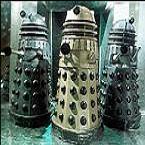Mike Wood
Posts: 2095
Joined: 3/29/2000
From: Oakland, California
Status: offline

|
Hello...
The issue of aircraft spotting ground units is a thorny one, from a coding standpoint.
You will note that when visibility is high in the game you can see through one or two woods hexes, but when visibility is low, the first woods hex blocks LOS. This is because there is no variable for woods density. The visibility variable also determines woods density, that is the amount of undergrowth and proximity of the tree trunks. The season is not used as a variable, so in the winter, deciduous trees offer as much concealment as coniferous trees.
Aircraft do not use the undergrowth factor for spotting. They use the density of the canopy. The canopy is also determined by the visibility. In reality, the canopy would depend on the type of trees in the hex. Aspen or birch would offer little in the way of concealment, where as oak or elm, in the correct season could offer fairly good concealment.
The code problem occurs when you consider the 850 unique locations in the game and the four seasons of the year. Even then, there would be endless arguments on this forum as to the relative canopy provided by cedar against bois d' arc.
quote:
Originally posted by bravo.john:
Rather than redesign the whole terrain system, surely you can check what terrain is in adjacent hexes. Give a bonus to avoid detection for every adjacent woods hex. Units in a 50m wood on an open plain would be pretty exposed. Units in the center hex of a 150m+ wood would be well hidden compared to units on the edges of that same wood.
None of the above discussion would help in the situation you present. The unit is in a tree hex and therefore gains a spotting defensive bonus. The size of the unit is also very important in the calculations, so that infantry is a lot harder to spot than trucks or tanks. This spotting defensive factor is compared to the offensive spotting factor. In the case of very highly skilled pilots, they will spot units in the woods often and conversely, pilots of low skill will seldom spot anything in the woods. Offering a greater defensive spotting bonus for units deep inside woods would only be a difference of a small degree and the player should turn down the spotting in preferences, if he feels units are spotted to often. As far as the realism of the seemingly logical notion that units at the center of a 150 meter woods being harder to spot by aircraft than those at the edge, I am not so sure of this. My experience in flying low over woods in my Cessna 150 would indicate this not to be the case. And, even if it were so, it would be only when flying from the clear side towards the woods.
I can understand the frustration the original post felt, when he though he would be safe in the woods and then got bombed. Last night, in a long campaign, I was attacking across a river and found a bridge was still standing. So, I put all 10 of my KV-1 tanks on the bridge, along with all three of my companies of motorized infantry and my recon company. In a strange twist of fate, I had air parity in the region, even though it was August of 1941. So, I had 4 air strikes and troop transports available. I loaded up my parachute battalion and directed them to drop near the objectives. I was praying they could hold on until my motorized column got there to relieve them. I was little worried about the drop sites, which were very small, because the German side of the river was forested. Now, I knew that early war Soviet pilots are not great at spotting enemy ground units in the game and I did not want them to attack my paratroopers by mistake, so I plotted all 4 air strikes to occur on turn one. I also plotted my transports to leave the map by the longest route possible, in hopes that they might spot some enemy units.
Although enemy anti-aircraft artillery was severe, none were ever spotted. The first air strike bombed a bunch of squirrels hiding in the woods. I believe the second strike got a badger. The third strike finally spotted some units. Specifically, my main force, all on the bridge. As the aeroplane approached, I could only hope it would bomb short. No, right on target. Bridge destroyed. Main force drowned. Not one enemy unit was spotted by 4 air strikes and 16 transports. The problem was that the Germans had very high experience, my air crews did not, and I did not target closely enough to any of their tanks to spot them from the air. So, woods hexes are sometimes of value.
Bye...
Michael Wood
_____________________________
|
 Printable Version
Printable Version








 New Messages
New Messages No New Messages
No New Messages Hot Topic w/ New Messages
Hot Topic w/ New Messages Hot Topic w/o New Messages
Hot Topic w/o New Messages Locked w/ New Messages
Locked w/ New Messages Locked w/o New Messages
Locked w/o New Messages Post New Thread
Post New Thread